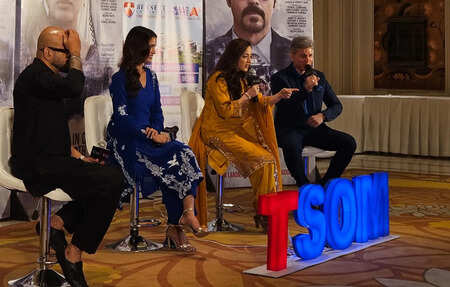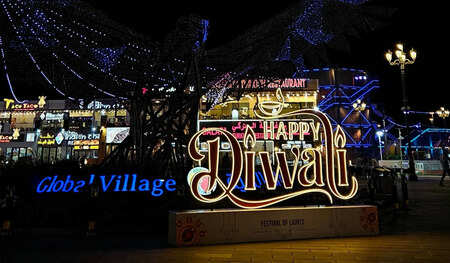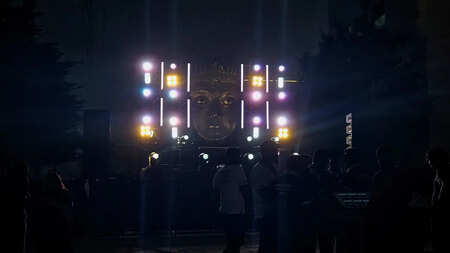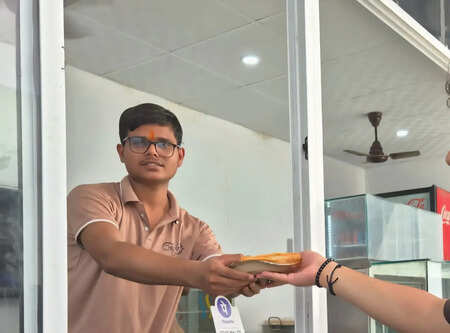Will Congress-led MPSA make a comeback in Manipur?
Times of Bennett | Updated: Mar 10, 2022 09:42

By NAVYA MITTAL
New Delhi: In the north-eastern state ofManipur , the Bharatiya Janata Party (BJP ) is expected to retain 32-38 seats, while the Congress, which won 28 seats in 2017, might only secure 12-17 seats in the 60-seat legislature, according to India Today-My Axis exit poll result. In 2017, the BJP formed an alliance with the National People's Party (NPP), Naga People's Front (NPF), and Lok Janshakti Party (LJP) but this time they have decided to contest solo while the Congress decided to build an alliance with six other parties.
The term of the current government inManipur began on March 20, 2017 and is set to end on March 19, 2022. This two-phase election was held on 28th February and 5th March.
In phase 1, the voting took place across 38 constituencies with a total of 173 candidates and approximately 12 lakh eligible voters. On the other hand, in phase 2, the voting took place across 22 constituencies with a total of 92 candidates and more than 8 lakh eligible voters.
Prominent candidate list
N Biren Singh, the Chief Minister and BJP candidate, Assembly Speaker Y Khemchand Singh, Deputy Chief Minister and NPP candidate Yumnam Joykumar, and Manipur Congress president N Lokesh Singh were among the prominent candidates in phase one. Singh was elected as the first BJP chief minister of Manipur in March 2017.
In phase 2, the key candidates were Okram Ibobi Singh, Gaikhangam, Losii Dikho, Letpao Haokip, and Awangbow Newmai.
Key parties involved:
-Bharatiya Janta Party
-National People's Party
-Naga People's Front
-Lok Janshakti Party
-Manipur Progressive Secular Alliance (MPSA) consisting of a six-party coalition, namely, Congress, Communist Party of India, Revolutionary Socialist Party, Communist Party of India (Marxist), Janata Dal (Secular) and Forward Bloc.
Key issues:
-Development
-Militancy
-Illicit drug trade
-Repeal of the AFSPA
-Women empowerment
-Growing unemployment
-Corruption
-Political instability
-Issue of Schedule Tribe reservations
Demographics and poll preparations
According to theElection Commission of India , in the Manipur Assembly elections , 88.63 per cent of the state's total 12,09,439 voters cast ballots, setting a new high. Male voter turnout was 87.29 per cent, while female voter turnout was 89.96 per cent. There are 5,80,607 male voters, 6,28,657 female voters, and 175 transgender votes out of almost 12 lakh voters.
Physically handicapped voters also used IT programmes to reserve 176 wheelchairs.
From 13 designated camps in Churachandpur, Pherzawl, Bishnupur, and Kangpokpi, 247 out of 253 ex-militants voted by postal ballot.
In the second phase of the Manipur Assemblyelections , there were 1,247 voting stations.
Those who test positive for Covid voted in the last hour, between 3 and 4 p.m.
New Delhi: In the north-eastern state of
The term of the current government in
In phase 1, the voting took place across 38 constituencies with a total of 173 candidates and approximately 12 lakh eligible voters. On the other hand, in phase 2, the voting took place across 22 constituencies with a total of 92 candidates and more than 8 lakh eligible voters.
Prominent candidate list
N Biren Singh, the Chief Minister and BJP candidate, Assembly Speaker Y Khemchand Singh, Deputy Chief Minister and NPP candidate Yumnam Joykumar, and Manipur Congress president N Lokesh Singh were among the prominent candidates in phase one. Singh was elected as the first BJP chief minister of Manipur in March 2017.
In phase 2, the key candidates were Okram Ibobi Singh, Gaikhangam, Losii Dikho, Letpao Haokip, and Awangbow Newmai.
Key parties involved:
-Bharatiya Janta Party
-National People's Party
-Naga People's Front
-Lok Janshakti Party
-Manipur Progressive Secular Alliance (MPSA) consisting of a six-party coalition, namely, Congress, Communist Party of India, Revolutionary Socialist Party, Communist Party of India (Marxist), Janata Dal (Secular) and Forward Bloc.
Key issues:
-Development
-Militancy
-Illicit drug trade
-Repeal of the AFSPA
-Women empowerment
-Growing unemployment
-Corruption
-Political instability
-Issue of Schedule Tribe reservations
Demographics and poll preparations
According to the
Physically handicapped voters also used IT programmes to reserve 176 wheelchairs.
From 13 designated camps in Churachandpur, Pherzawl, Bishnupur, and Kangpokpi, 247 out of 253 ex-militants voted by postal ballot.
In the second phase of the Manipur Assembly
Those who test positive for Covid voted in the last hour, between 3 and 4 p.m.







